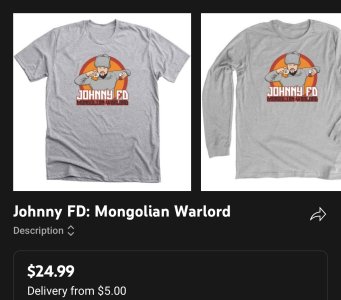John Wick
formerly jayzonmytoes
- Oct 5, 2006
- 7,270
- 3,056
Russell has a good view on this
Follow along with the video below to see how to install our site as a web app on your home screen.
Note: This feature may not be available in some browsers.
We did Conquer Hawaii, but in modern times, this beyond anything we've ever. done.While I agree on your overall point, lets keep it buck. We have never set out to conquer any country though. Influence,? Yes pillage? of course...but this is beyond the pale.

 @ “Mongolian Warlord”
@ “Mongolian Warlord”That’s what I was thinking too but isn’t it just essentially him not wanting more countries to just join NATO and be against him. As in Ukraine was on the verge of thatThis argument about Putin not wanting NATO at their borders sounds ridiculous.... so instead he's trying to expand his borders next to NATO????
Man ... that's the excuse ....... makes no sense to occupy a country to fend off NATO when this country is going to revolt first change they get.
Iight...
NATO dropped the ball heavily on this, they were cautioned 10+ years ago to limit their expansionism especially with Turkey being a member of NATO. Try to imagine Ukraine also being a NATO member and there's a massive security threat to Russia

Back in 1952, with the alliance just a few years old, it expanded for the first time, welcoming two new members: Greece and Turkey. At the time, President Harry Truman offered membership to both as a way to contain Communist expansion—Greece’s Western-backed government had just defeated Communist forces in a civil war. It helped that Turkey also gave the alliance a foothold close to the Middle East.
This soon became a case of more allies, more problems. When Turkey invaded Cyprus in 1974 following a Greece-backed military coup, the two allies came into direct conflict; in fact, Greece left NATO over it, before later rejoining. Later, the U.S. flew bombing raids on Iraq from Turkey’s Incirlik Air Base during the 1990–91 Gulf War; in 2003, though, Turkey refused to station U.S. troops on its territory to attack Baghdad. (Other U.S. allies, namely France and Germany, also opposed the 2003 Iraq War, though France was not fully participating in NATO at the time.) As for that whole democratic-values thing, the military stepped in to run the country about every decade or so.
But by the time anti-government protests swept Arab countries in 2011, Turkey looked like a model of stability and Islamic democracy. In an interview with NATO Review in 2012 marking 60 years of Turkey being in NATO, then–Turkish Defense Minister Ismet Yilmaz said that in joining the alliance, Turkey had made its direction, and its security, “the same as the West’s.” He went on: “This was not a decision Turkey took only in 1952. This was the consequence of Turkey supporting Western values. Let’s not say Western—universal values, which are democracy, human rights, and core values of human rights based on the rule of law.” Turkey was even negotiating for membership in the European Union.
Which all now seems a bit rich, given that the current leader, Recep Tayyip Erdoğan, a self-avowed champion of the Muslim Brotherhood, has changed the constitution, rerun elections that didn’t favor his political party, and led a crackdown on journalists and political dissenters, as well as a purge of thousands suspected of involvement in a failed 2016 coup. Even on the interests front—Incirlik Air Base has been central to U.S. counterterrorism efforts in the ISIS era—hitches came up. The Turkish government did little to rein in ISIS fighters transiting its territory to join the battles in Iraq and Syria; some ISIS members even passed through Turkey to carry out attacks in Europe. Erdoğan’s government has bought Russian air defenses over vigorous American objections and in the face of sanctions threats, and as of this week, the Turkish government ditched an agreement that U.S. officials had hoped would keep the peace in northeastern Syria.
Meh.I agree 100%. The issue is the US has zero credibility when condemning these things cause thats exactly what we do all over the world, nowhere near our borders.
While I agree on your overall point, lets keep it buck. We have never set out to conquer any country though. Influence,? Yes pillage? of course...but this is beyond the pale.
While I agree on your overall point, lets keep it buck. We have never set out to conquer any country though. Influence,? Yes pillage? of course...but this is beyond the pale.



USA doesn’t have to “conquer” cuz they pull up in a country, F it up behind the scenes, take what they want and leave the resulting chaos to the locals to handle…They’ve perfected this over the years all in the name of “freedom” and “anti terrorism”While I agree on your overall point, lets keep it buck. We have never set out to conquer any country though. Influence,? Yes pillage? of course...but this is beyond the pale.